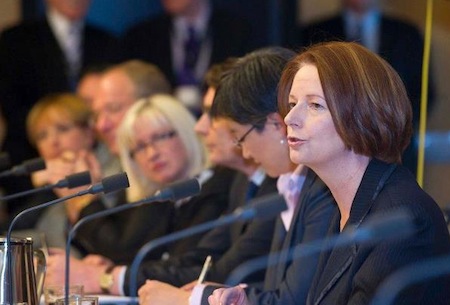
It’s not just American politicians who have a hard time dealing with illegal immigration.
Unravelling stability in Afghanistan, where the United States has led an 11-year military effort, may be exacerbating a rise in boat-bound refugees to Australia, causing headaches for its Labor-led government.


Australian prime minister Julia Gillard yesterday announced that her government would seek to enact the recommendations of a nonpartisan review and adopt a version of the ‘Pacific Solution’ adopted by Labor’s predecessor Liberal government of John Howard — Gillard has called on Australia’s parliament to pass a new law allowing for the reopening of detention centers on Nauru and on Manus Island in Papua New Guinea within as soon as a month.
The move will result in a return to offshore processing for asylum-seekers trying to arrive by boat to Australia. That means that such refugees would face years of detention in Nauru or PNG if apprehended by Australian authorities at sea.
It’s a 180-degree turnaround for Labor, although Gillard had promised (during her latest interparty leadership contest with former prime minister Kevin Rudd in February) to reverse what’s been a five-year upswing in illegal arrivals by sea to Australia — and a correspondingly higher number of refugee deaths. So although Gillard may be weakened by the sudden turn, it’s an issue that’s long been a political albatross for her and for Labor. When Labor returned to power in 2007 under Kevin Rudd, the party quickly scrapped the ‘Pacific solution’ by enacting what Rudd considered more humane policies, closing the Nauru and PNG detention centers in favor of onshore processing centers.
The key question over the past five years is why the number of refugees by boat rose so dramatically in 2007 — proponents of the Pacific Solution, such as Liberal/National Coalition leader Tony Abbott, argue that the leniency of Labor asylum policies encouraged more refugees to arrive by sea. Abbott supports the return to using offshore detention, has harshly criticized Labor policy for resulting in over 600 refugees deaths by drowning, and is today crowing over Gillard’s reversal:
“I’ve been saying for four years that the Prime Minister should pick up the phone to Nauru,” says the Opposition Leader.
“We have had enormous cost, untold tragedy and trauma that could have been avoided if the Prime Minister had been prepared to do this at any time in the last four years,” says Tony Abbott.
“We’ve had 22,000 illegal arrivals, almost 400 illegal boats.”
Although many of the refugees come directly by boat from Indonesia or Malaysia, asylum-seekers often begin their journey from throughout greater Asia, including China, Vietnam, Iraq, Iran and Afghanistan. Even under the Pacific Solution, most refugees who arrived by boat were bona-fide refugees and around two-thirds were either granted asylum in Australia or resettled in other countries.
Opponents of the Pacific Solution, such as former prime minister Malcolm Fraser, say that the number of refugees rose due to external factors. Fraser, a former Labor prime minister of Australia from 1975 to 1983, yesterday called Gillard’s propsed approach ‘racist’: Continue reading Gillard’s 180-degree turn and what it means for Australian asylum policy →

